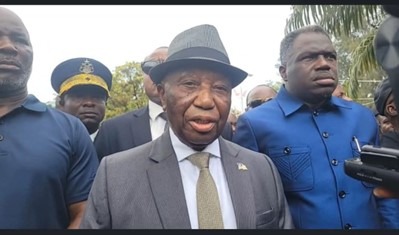The Capitol Building in Monrovia, Liberia, was engulfed in flames on Wednesday, December 18, 2024, prompting President Joseph Boakai to launch an immediate investigation into the incident. The fire, which ravaged the Joint Chamber of the Legislature, occurred less than 24 hours after violent clashes between police and protesters who were demanding adherence to the rule of law amidst an ongoing leadership crisis within the House of Representatives. President Boakai, accompanied by Vice President Jeremiah Koung, visited the damaged building to assess the extent of the destruction and express solidarity with members of the Legislature. He condemned the act as “banditry and gangsterism,” vowing that those responsible would be brought to justice. He emphasized the government’s commitment to a thorough investigation, leaving “no stone unturned” in pursuit of the perpetrators. The President lamented the incident, characterizing it as an act of hooliganism and emphasizing the sanctity of the Capitol Building as a place for responsible public servants. He reiterated that the rule of law should be the avenue for addressing grievances, not acts of violence and destruction.
The fire has further intensified the existing political tensions stemming from a power struggle within the House of Representatives. Months prior to the fire, a faction of lawmakers, identifying themselves as the Majority Bloc, attempted to oust Speaker J. Fonati Koffa, an action met with resistance from minority representatives. This move ignited a controversy that continued to simmer, ultimately culminating in the violent protests and the subsequent fire incident. In the immediate aftermath of the fire, accusations arose linking Speaker Koffa, who maintained his claim to the speakership, to the incident. While Speaker Koffa denied any involvement through a Facebook post, suspicion remained.
Adding to the complexity of the situation, Representative Saah Foko, a staunch supporter of Speaker Koffa and the minority bloc, was summoned by the Liberia National Police (LNP) for questioning. This followed the resurfacing of a video from July in which Representative Foko threatened to burn down the Joint Chamber of the Capitol Building. This prior threat cast a shadow of suspicion over Representative Foko and further fueled speculation about the motives behind the fire. The ongoing investigation faces the challenge of disentangling the complex web of political rivalries, accusations, and potential motives to determine the true cause of the fire and identify those responsible.
The fire at the Capitol Building represents a significant blow to Liberia’s democratic institutions. It underscores the fragility of the rule of law and raises concerns about the potential for political disputes to escalate into violence. The incident also highlights the importance of a swift and impartial investigation to ensure accountability and restore public trust in the government. As the investigation unfolds, Liberians await answers and justice, hoping for a resolution that will strengthen their democratic processes and prevent future acts of violence. The international community is also watching closely, emphasizing the need for peaceful resolution of political disputes and upholding the rule of law.
The incident serves as a reminder of the vital role of dialogue and compromise in democratic societies. The resort to violence and destruction undermines the very foundations of democratic governance and threatens the stability of the nation. The fire at the Capitol Building should serve as a wake-up call for all stakeholders in Liberia’s political landscape to engage in constructive dialogue and uphold the principles of democracy. It is crucial for political leaders to prioritize the interests of the nation and work towards peaceful resolutions to their differences, thereby setting an example for their constituents. The future of Liberia’s democracy hinges on the ability of its leaders to embrace peaceful means of resolving conflicts and prioritize the well-being of the nation over partisan interests.
The investigation into the Capitol Building fire is not merely about identifying the perpetrators and bringing them to justice. It is also about addressing the underlying issues that led to this act of violence. The leadership crisis within the House of Representatives, the protests, and the subsequent fire are all symptoms of a deeper malaise within Liberia’s political system. It is essential for the government to address these systemic issues to prevent future incidents and strengthen the foundations of democracy. The investigation, therefore, represents an opportunity for Liberia to reflect on its democratic processes and identify areas for improvement. This requires a commitment from all stakeholders to engage in a constructive dialogue aimed at strengthening institutions, promoting transparency, and upholding the rule of law. The outcome of this investigation and the subsequent actions taken by the government will be crucial in determining the future trajectory of Liberia’s democracy.


